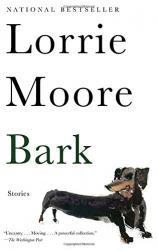Bark: Stories
Review
Bark: Stories
I’ll admit that I’m one of those people. I geek out over anything written by Lorrie Moore. Her novels (ANAGRAMS, WHO WILL RUN THE FROG HOSPITAL, GATE AT THE STAIRS), as well as her three previous story collections (SELF-HELP, LIKE LIFE and BIRDS OF AMERICA), are hard-hitting catalogs of human desires and shortcomings, populated by characters fumbling through relationships and sullying up their personal lives with such veracity and tenacity that it’s hard not to relate to, or even admire, their dedication. But I don’t read Moore’s work only to think “been there, done that,” although that’s certainly part of her draw. Like any gifted chronicler of woes, it’s also the way she spins her stories --- using wry humor, keen observation and no-bs delivery to slice through any pretense about how life could or should be in favor of pinpointing just how it is.
There’s no doubt that Moore’s new short(er) story collection BARK --- her first in 16 years and one that includes stories that have been previously published in the New Yorker and Harper’s --- is as bleak and brooding as they come. In fact, given what she’s had to work with for inspiration over the last two decades --- 9/11, the wars in Iraq and Afghanistan, the rise and fall of tyrannical dictatorships coupled with the crushing of worthwhile revolutions and the widespread loss of lives, not to mention the ever-encroaching technological takeover of all things personal and the virtual erasure of privacy in favor of total access and corporate branding for all --- it might be her angriest book yet.
To read these eight stories, each one more unsettling than the last, it’s hard not to jump on the bandwagon of incredulity and ask ourselves what kind of collective fog we have willingly entered into to allow such atrocities to occur. Are we blind to our roles in these mounting injustices, or are we just stupid? Or selfishly indifferent?
Perhaps the most overtly political of the stories are the book’s shortest and arguably, aside from the one-note “The Juniper Tree” about a trio of friends who orchestrate an eerie séance for a recently deceased friend, weakest. In “Subject to Search,” the beans of the Abu Ghraib scandal are spilled during a rendezvous turned interrupted lunch conversation between an exhausted and depressed international operative and an old-friend-turned-possible-flame independent contractor. In “Foes,” a biographer misreads the intentions of a hard-nosed right-wing lobbyist seated next to him at a Georgetown fundraising dinner. In both cases, the global tragedies hinted at are given short shrift in favor of dedicating too much page time to the characters’ awkward relationships or inadequacies. Rarely, this time, less of that would’ve meant more.
"To read these eight stories, each one more unsettling than the last, it’s hard not to jump on the bandwagon of incredulity and ask ourselves what kind of collective fog we have willingly entered into to allow such atrocities to occur."
But about those pesky personal problems. In BARK, like in her previous collections, Moore’s characters don’t escape unscathed. Instead, they’re wracked with guilt, rage, frustration, sorrow --- and, the inevitable worst part is, they’ve aged. For the lonely elderly widow in “Wings” who impulsively bequeaths his cluttered estate to “one of his Concertos in Be Minor” (grin), a 38-year-old ex-musician in a dead-end relationship who shows him kindness in the form of trips to the beach and conversations over store-bought muffins, or the dried-up narrator of “Paper Losses” who accompanies her philandering soon-to-be ex-husband on vacation to the Caribbean in order to “save face” for the kids, time is decidedly not on their side --- a shocking conclusion that has these beaten-down souls either trapped or running scared. And when the scales are that tipped, it’s just plain easier to turn to denial no matter what the consequences.
But turn away, you musn’t! Despite the pu pu platter of doomed affairs, disastrous marriages, and general all-encompassing angst, much of Moore’s prose is unabashedly funny, and her signature wit riddled with wordplay and double entendres is expertly timed. In the opening story “Debarking,” the snicker-worthy chronicling of a newly divorced man who embarks on a new relationship with a beautiful but perceptibly insane woman he meets at a dinner party --- her face “blasted apart” by laughter, her jaw “snapping mutely open and shut like a scissors” --- would be really depressing if Moore’s pithy dialogue and zingy one-liners wasn’t so amusing: “Bummer,” said Ira, his new word for “I must remain as neutral as possible” and “Your mother’s a whore.” In “Paper Losses,” the narrator’s take on divorce? “Was not everything fixable? This age of disposables, was it not also an age of fantastic adhesives? Why ‘irretrievably broken’ like a songbird’s wing? Why not ‘Do you find this person you were married to, and who is now sitting next to you in the courtroom, a total asshole?’ That would suffice, and be more accurate.”
Priceless.
In spite of these glee-inducing musings, the mood of the collection on the whole appears to be grim: “Living did not mean one joy piled upon another. It was merely the hope for less pain, hope played like a playing card upon another hope, a wish for kindness and mercies to emerge like kings and queens in an unexpected change of the game. One could hold the cards oneself or not: they would land the same regardless.” But as one of her characters notes and Moore knows as well as we do, “we’re all suckers for a happy ending.” It’s maybe for this reason that BARK ends on a high note. Sort of.
“Thank You for Having Me” isn’t cheery. It doesn’t imbue us with a false sense of hope. But it does impart a nugget of wisdom we shouldn’t choose to ignore: “People shouldn’t have been set in motion on this planet only to grieve losses. And without weddings there were only funerals… So much urgent and lifelike love went rumbling around underground and died there, never got expressed at all, so let some errant inconvenient attraction [or whatever else] have its way. There was so little time.”
BARK teaches us that there is so little time. So, despite conflict, despite nagging inadequacies, despite unresolved endings, maybe let’s try --- just this once --- to make the best of it.
Reviewed by Alexis Burling on February 28, 2014
Bark: Stories
- Publication Date: October 28, 2014
- Genres: Fiction, Short Stories
- Paperback: 208 pages
- Publisher: Vintage
- ISBN-10: 0307740862
- ISBN-13: 9780307740861





